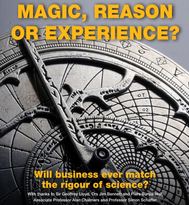 Will business ever match the rigour of science? The notion of modern day science emerged in the early nineteenth century – William Whewell coined the term scientist in 1833. Before that, anyone investigating how the world worked was known as a “Natural Philosopher”. As a concept, “science” is much more than simply a word that represents technological development and invention. At its heart, it is a methodology for gathering the right data or facts, analysing them in a rigorous and reliable manner, and interpreting the findings and assessing their meaning. It is a process for evaluating theories about how parts of the universe really work, examining “proof”, and hence arriving at “truth”. Thus science is a philosophical paradigm. It is designed to support the development of thinking, increase in human understanding, and reliable decision-making. Every half-decent scientist understands the scientific method, and the importance of how experiments are run, data is gathered and ideas are tested. Unscrupulous researchers may seek to bend the rules or bend the data, but the global community of peer reviewers who subscribe to the scientific method will scrutinise their data, their analysis and their findings. There is no “bend it like Beckham” when it comes establishing the veracity of a new theory. This process – this philosophical paradigm – has been responsible for the most dramatic period of technological advances and associated economic development that the world has ever seen. It is no co-incidence that the industrial revolution followed hard on the heels of the birth of the scientific method. Since the start of the industrial age, there has been technological revolution after revolution, with the pace of change accelerating decade by decade. As one example, the smart phone has changed the lives of billions of people in the seven short years since the iPhone was born. So it is nothing short of remarkable, then, that the same rigorous approach to gathering and evaluating data and reaching conclusions has never been brought to the world of business. Read on... Comments are closed.
|
Pottinger PerspectivesOur take on issues that are changing the world, and how you can make the most of uncertainty Categories
All
|
|
We pay respect to Traditional Custodians and First Nations peoples everywhere, including the Gadigal People of the Eora Nation and the Lenape
|

 RSS Feed
RSS Feed